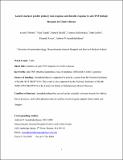| dc.contributor.author | Barber, Grant E. | |
| dc.date.accessioned | 2019-06-24T10:47:52Z | |
| dc.date.created | 2016-05 | |
| dc.date.issued | 2019-03-29 | |
| dc.date.submitted | 2016 | |
| dc.identifier.citation | Barber, Grant E. 2016. Genetic Markers Predict Primary Non-Response and Durable Response to Anti-TNF Biologic Therapies in Crohn’s Disease. Doctoral dissertation, Harvard Medical School. | |
| dc.identifier.uri | http://nrs.harvard.edu/urn-3:HUL.InstRepos:40620225 | * |
| dc.description.abstract | Background: One-fifth of patients with Crohn’s Disease (CD) are primary non-responders (PNR) to anti-tumor necrosis factor (anti-TNF) therapy, and an estimated 10-15% will fail therapy annually. Little is known about the genetics of response to anti-TNF therapy. The aim of our study was to identify genetic factors associated with PNR and loss of response to anti-TNFs in CD.
Methods: From a prospective registry, we characterized the response of 427 CD patients to their first anti-TNF therapy. Patients were designated as achieving primary response, durable response, and non-durable response based on clinical, endoscopic, and radiologic criteria. Genotyping was per-formed on the Illumina Immunochip. Separate genetic scores based on presence of predictive genetic alleles were calculated for PNR and durable response and performance of clinical and genetics models were compared.
Results: From 359 patients, 36 were adjudged to have PNR (10%), 200 had durable response, and 74 had non-durable response. Primary non-responders had longer disease duration and were more likely to be smokers. Fifteen risk alleles were associated with PNR. Patients with PNR had a significantly higher genetic risk score (p=8 x 10-12). A combined clinical-genetic model more accurately predicted PNR when compared to a clinical only model (0.93 vs. 0.70, p < 0.001). Sixteen distinct SNPs predicted durable response with a higher genetic risk score (p=7 x 10-13). The genetic risk scores for PNR and durable response were not mutually correlated suggesting distinct mechanisms.
Conclusion: Genetic risk alleles can predict primary non-response and durable response to anti-TNF therapy in Crohn’s disease. | |
| dc.description.sponsorship | Scholarly Project | |
| dc.format.mimetype | application/pdf | |
| dc.language.iso | en | |
| dash.license | LAA | |
| dc.subject | Infliximab | |
| dc.subject | adalimumab | |
| dc.subject | non-response | |
| dc.title | Genetic Markers Predict Primary Non-Response and Durable Response to Anti-TNF Biologic Therapies in Crohn’s Disease | |
| dc.type | Thesis or Dissertation | |
| dash.depositing.author | Barber, Grant E. | |
| dc.date.available | 2019-06-24T10:47:52Z | |
| thesis.degree.date | 2016 | |
| thesis.degree.grantor | Harvard Medical School | |
| thesis.degree.grantor | Harvard Medical School | |
| thesis.degree.level | Doctoral | |
| thesis.degree.level | Doctoral | |
| thesis.degree.name | Doctor of Medicine | |
| thesis.degree.name | Doctor of Medicine | |
| dc.type.material | text | |
| dash.identifier.vireo | | |
| dash.title.page | 1 | |
| dash.author.email | grantericbarber@gmail.com | |


